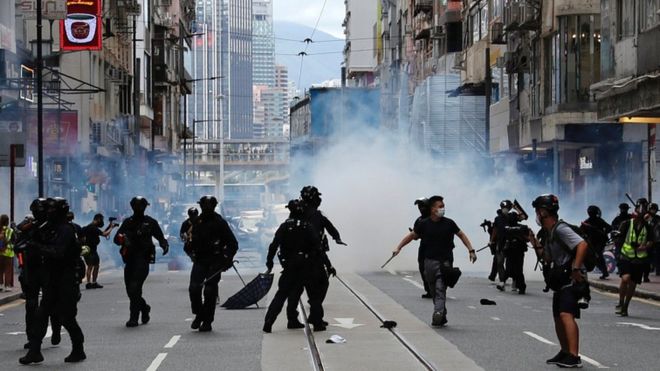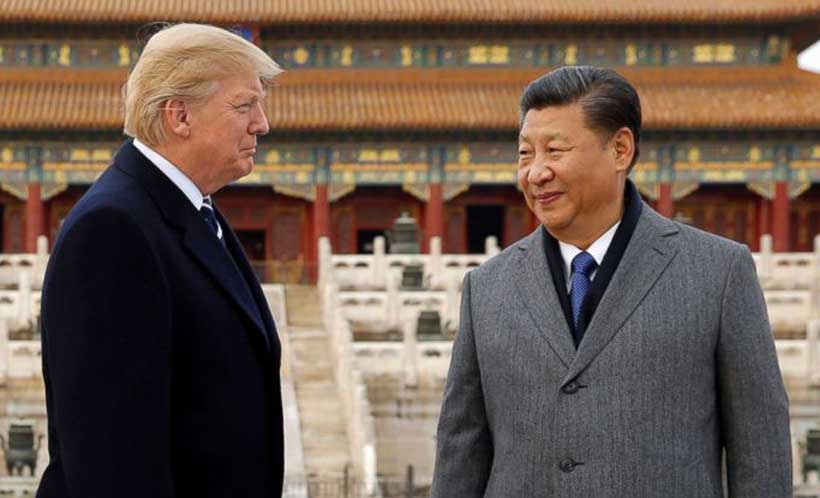A Shifting World Political System Eyeing Chinese-Style Authoritarianism
"While problems between the West and China grew in number, there was no overall response that saw these as elements - trade tensions, technological rivalries, strategic issues and so on - as part of a bigger 'China problem' that required a concerted and co-ordinated response. This was the world on the brink of the Covid-19 crisis; a drama that originated in China and which initially caused some serious problems for Beijing, but one which it was clearly determined to turn to its advantage. It is no accident then that a more strident nationalist tone in Chinese policy has been the result, ranging from tensions with the US and Australia, Sino-Indian rivalry on their common frontier, and to cap it all, China's decision to overturn the fundamentals of its deal with the UK over Hong Kong. Indeed the Covid-19 crisis gave Beijing the opportunity to bring the Hong Kong crisis to a head. However long this pandemic lasts, one consequence is clear - the trajectory of Beijing's more assertive policy is unlikely to change unless real and concerted pressure is brought to bear. And for all the condemnation of China's attitude towards the liberties of the people of Hong Kong, it is hard to see this happening." Jonathan Marcus, BBC News
 |
| Hong Kong demonstrations Reuters |
Where to start? Let's try the one, signal issue that has incorporated the entire globe into a fused concern, the global pandemic known as COVID-19, caused by the SARS-CoV-2 virus that suddenly appeared in Wuhan, China back at the turn of the year that brought us into 2020. The year that everything changed. And keeps changing. World history brought to a head, making 2020 a significant year for change and a wholesale disturbance that has roiled the world.
Originating in China and swiftly transposed to the rest of the world, in part thanks to Beijing's efforts to cover up its existence, then failing to give timely and transparent warning, much less its concerted efforts to ensure that the rest of the world didn't close its borders to China, there is much to fault the Chinese Communist Party which rules the country under President Xi Jinping for. Including the fact that once China brought its own initial wave of COVID under control, it saw opportunities in its position as major supplier of the world's PPE.
 |
The ensuing major crisis in the United States, swiftly taking over first place from Italy and Spain in the number of cases and deaths, put a quick end to U.S. President Donald Trump's first impressions of China's Xi Jinping as an admirable man he could do business with. Now Mr. Trump speaks of the "China virus" and not admiringly, a virus that has trashed the U.S. economy and pretty well given a death sentence to his aspirations for a second term in office.
The U.S. FBI Director Christopher Wray has said he has "opened a new counter-intelligence investigation on China every ten hours", to which Beijing responds that the Houston consulate spoken of as a "nest of espionage", was countered by Beijing ordering the closure of the U.S.consulate in Chengdu, all laid at the feet of Secretary of State Mike Pompeo whose rationale was "a hodge-podge of anti-Chinese lies" to hear Beijing tell it. The spark that lit this fire was the new trade agreement being hammered out between Beijing and Washington. Kaput.
U.S. European allies are being prodded to remove their supply chains from China, mostly in pharmaceuticals and technology. This, at a time that the European Union is negotiating an investment agreement with China. A China that remains dependent on the global economy to rely on its manufacturing exports which in turn promotes its ongoing process of development. Decoupling from China would be an arduous process, but for China an impediment to the progress of its "Belt and Road" infrastructure investment program.
Sanctions imposed by the U.S. on human rights violations against the Uyghur Muslims in Xinjiang certainly represent a sore point in China-U.S. relations. On this file the U.S. has plenty of support; from the U.K. protesting forced sterilization of the Uyghurs, and the return of Hong Kong to Chinese rule, yanking its autonomous status precipitately despite the covenant signed with the U.K. in 1997, leading to a U.K. citizenship offer for close to three million Hong Kong residents.
/https://www.thestar.com/content/dam/thestar/opinion/contributors/2020/04/25/trumps-china-blame-game-hastens-new-world-order/xi_jinping_and_trump.jpg) |
The U.S. and 26 Western democracies criticized China's retraction of the "one country, two systems" agreement at the UN Human Rights Council, leading 53 UN members led by Cuba to sign a resolution in support of Beijing, thus aptly demonstrating the lack of relevance of the United Nations. Then there is the issue over China's South China Sea territorial claims, upsetting its near neighbours directly facing the threats of Chinese aggression and growing military presence.
World stability hasn't been particularly enhanced by the prospect of China deciding to challenge India over their mutual claims of territory in the Himalayas. A situation where the Modi administration may wish to move closer in political alignment with the United States, even while China is making accommodations with Pakistan and Iran both of which would be grateful for the financial investment aid on the horizon. Egypt too is now accessible to China, with a newly signed agreement on vaccine production.
Labels: U.S. President Donald Trump, United States, Uyghurs, Xi Jinping

<< Home